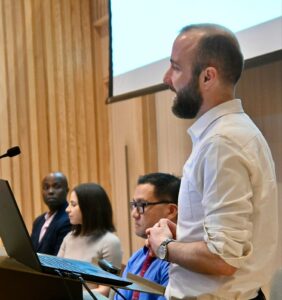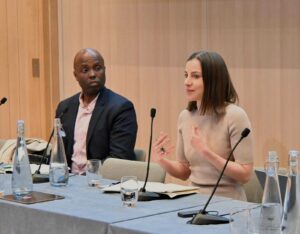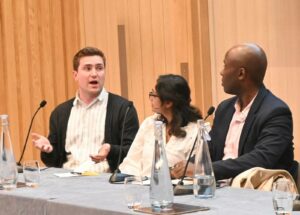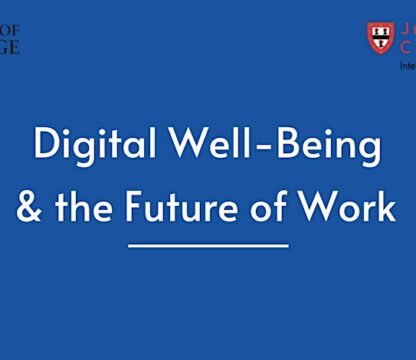By Amaia Robertson Nogues, ThinkLab Team Member
On 15 April, 2024, ThinkLab brought together a range of experts from across academic and industry sectors to discuss digital wellbeing and the near-future of work. Hosted by the Intellectual Forum, the collaborative event was held at the Frankopan Hall in Jesus College, Cambridge and featured a panel that consisted of experts Dr Thomas Roulet, Dr Kiran Bhatti, Dr Aisha Sobey, Dr Lawrence Ampofo, Tyler Shores, Iliana Grosse-Buening and Dr Matthew J. Dennis.
Inspired by an international conference earlier this year in which Iliana Grosse-Buening and Dr Matthew J. Dennis presented talks focusing upon workplace distraction, digital wellbeing, and attention at a collective level. This event facilitated open conversation between audience members and experts to address how to reimagine our relationship with technology, as well as explore the different tools and tactics that can help improve digital wellbeing.
The discussion on ‘Who is Responsible for (Digital) Workplace Wellbeing’ explored the limitations of the ‘McDonald’s model’ in which responsibility for digital wellbeing is placed upon the user and not the corporations who profit greatly from the culture of endless scrolling. As our phones increasingly act as digital passports which facilitate a significant proportion of our daily activities, it is essential to reimagine perceptions of wellbeing whilst still being adaptable to users’ needs.

The talk presented by Matthew J. Dennis on ‘Creating a Culture of Attention: Individual and Collective Approaches to Digital Wellbeing’ touched on the different digital and non-digital strategies to help improve wellbeing. For instance regulation, time constraints, as well as the possibilities to incorporate gamification tactics for positive wellbeing outcomes. Increasing awareness of digital wellbeing practices has the potential to empower users to make informed decisions about their engagement with technology on an individual scale, but also can enable teams to enhance their attention capabilities, leading to improved productivity, resilience and fostering a positive digital culture.
During the panel discussion, important points were raised regarding the impact of how the pressure for constant productivity can have harmful repercussions, as well as how digital wellbeing and anti-distraction tactics can be particularly useful for neurodivergent users. There were also some insightful comments concerning the environmental cost of digital wellbeing tools, as well as the global cost of procrastination through streaming or dual-screen usage.

The panel consisted of Iliana Grosse-Buening, founder of Quiet Social Club and social entrepreneur; Matthew J. Dennis, professor in ethics of technology at TU Eindhoven; Lawrence Ampofo, founder of Digital Mindfulness and experienced AI strategist; Tyler Shores, Senior Research Associate at the Intellectual Forum in the fields of digital habits and environments; Aisha Sobey, Research Associate at the Leverhulme Centre for the Future of Intelligence specialising in wellbeing and digital systems; Kiran Bhatti, chartered counselling psychologist and researcher in employee wellbeing and Wellbeing Intelligence; Thomas Roulet, organisational sociologist and writer on the future of work.
The event concluded that wellbeing of all varieties needs to become a priority within the workplace to sustain healthy and productive employees and that conversations such as these between academic and occupational stakeholders are an essential first step to shaping our habits when considering the future of work. A special thank you to all of our speakers as well as all audience participants for their insightful comments.

Quotes:
“We need to understand attention not just as individual fragmented efforts, but as an ongoing strategy that is prioritised on every level of an organisation to empower individuals to cultivate the intentional practices that are essential to productivity, wellbeing, and human connection.” – Iliana Grosse-Buening
“Digital wellbeing needs to be an integral part of our everyday lives… the biggest threat to digital wellbeing are persuasive technologies, those things designed to grab our attention.” – Matthew J Dennis
Video Snippets:



